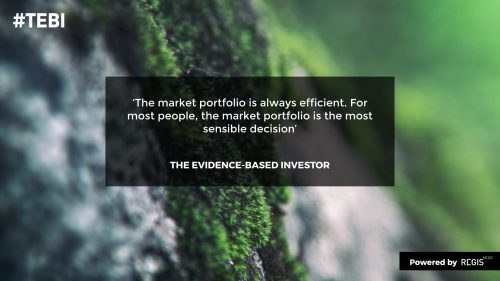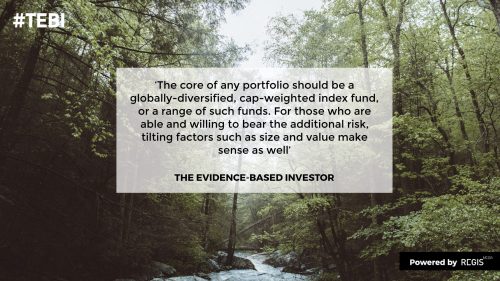Of all the interviews I conducted for the online documentary How to Win the Loser’s Game, two stand out — one with Vanguard founder Jack Bogle and the other with the Nobel Laureate Eugene Fama. Both are giants of the financial world who have changed the way we think about investing and the markets. Yet they appear to have very different views. Or do they?
I remember asking Fama what he thought of Bogle’s preference for market cap-weighted index funds. Considering Fama is as outspoken as Bogle and has spent most of his career identifying risk factors that deliver long-term outperformance, I expected him to be unenthusiastic about traditional index funds. On the contrary, he was very positive. Indeed, he apparently holds a cap-weighted portfolio himself.
In a recent keynote address given at the the Journal of Investment Management’s annual seminar in Boston, Massachusetts, Bogle made several references to Fama, and confirmed his own belief that the two of them are actually not poles apart.
The address focussed on Big Data and, in particular, Bogle’s scepticism about how useful it is in the continuing search of what he called “the Holy Grail of consistently superior returns”.
He and Fama certainly share an aversion to active fund management. Bogle began his address in Boston by flagging up a particularly crass attempt by an active manager at making a data-driven case for active stockpicking. It was shockingly flawed, grossly understating the average difference in costs between active and passive funds, and extrapolating the half-decent ten-year performance of one particular fund over an entire 225 years.
But Bogle then turned his attention to factor-based investing, which is Fama’s area of expertise. “Few investment principles,” he said, “have been as unchallenged as the now-perennial assertion that over the long run, small-cap stocks have outperformed large-cap stocks”. Apart from the period 1973 to 1983, when small-caps comfortably beat large-caps, Bogle pointed out that the two strategies have produced pretty similar results since 1928, and that, over time, the winning streaks enjoyed by each have more or less cancelled each other out.
Bogle then looked at the thesis that value stocks outperform growth stocks over the long term. For the 60-year period ending in 1988, he acknowledged that value did indeed come out on top. But over the next 11 years, that pattern was reversed, with growth stocks trouncing value stocks. Since 1999, returns have been almost equal.
As you’d expect, Bogle also pointed to the additional cost of implementing factor-based strategies, as opposed to simply investing in the broader market. “Place me squarely in the camp of the contrarians,” he said, “who are reluctant to accept the inevitable superiority of small-cap.. and value strategies.. in the years ahead.”
Of course, Fama does believe in the merits of tilting towards small-cap and value. But Bogle certainly doesn’t consider their views to be diametrically opposed. This is what he said:
“I’ve been excoriated for my views, but I’m comforted by this reported exchange between Dr Fama and a participant at an investment conference in the early 2000s:
“‘What do you say to people like Jack Bogle who examine this same data and say there is no size or value premium?’
“His (i.e. Fama’s) response: ‘How far are they from the slide? If I get far enough away, I don’t see it either. Whether you decide to tilt… depends on whether you are willing to take the associated risk… The market portfolio is always efficient. For most people, the market portfolio is the most sensible decision.’”
Some view Vanguard and Dimensional as rather like the Montagues and Capulets of the evidence-based investing world. Each has a distinctive approach and its own band of loyal devotees. In fact, you could invest all your money with one or the other and, as long as you stay the course, do very well indeed.
Far from being mutually exclusive, though, the two approaches are actually complementary; to put it another way, they’re like two sides of the same coin. For me, the core of any portfolio should be a globally-diversified, cap-weighted index fund, or a range of such funds. For those who are able and willing to bear the additional risk, tilting to factors such as size and value makes sense as well. But don’t expect to be rewarded for that extra risk any time soon; and bear in mind you may not be rewarded at all.
Jack Bogle: Numbers Games — Reflections on the Uses and Abuses of Big Data
ROBIN POWELL is the founder and editor of The Evidence-Based Investor. A freelance journalist, he runs Regis Media, a specialist content marketing consultancy for financial advice firms around the world. You can follow him on Twitter and on LinkedIn.
The Evidence-Based Investor is produced by Regis Media, a boutique provider of content and social media management to financial advice firms around the world. For more information, visit our website and YouTube channel, or email Sam Willet or Christina Waider.
How can TEBI help you?









